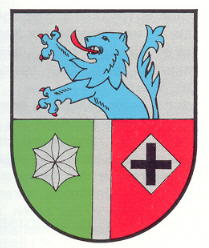Wiesweiler: Difference between revisions
Jump to navigation
Jump to search
Knorrepoes (talk | contribs) m (Text replace - "'''Origin/meaning :'''<br/>" to "====Origin/meaning====") |
Knorrepoes (talk | contribs) m (Text replace - "|width="15%"|50 px|right |}" to "|width="15%"|50 px|right |}<seo title="Wappen, Gemeindewappen" />") |
||
| Line 3: | Line 3: | ||
|width="70%" align="center" |'''Heraldry of the World<br/>Civic heraldry of [[Germany]] - [[Deutsche Wappen|Deutsche Wappen (Gemeindewappen/Kreiswappen)]]''' | |width="70%" align="center" |'''Heraldry of the World<br/>Civic heraldry of [[Germany]] - [[Deutsche Wappen|Deutsche Wappen (Gemeindewappen/Kreiswappen)]]''' | ||
|width="15%"|[[File:Germany.jpg|50 px|right]] | |width="15%"|[[File:Germany.jpg|50 px|right]] | ||
|} | |}<seo title="Wappen, Gemeindewappen" /> | ||
Revision as of 18:50, 5 November 2012
| Heraldry of the World Civic heraldry of Germany - Deutsche Wappen (Gemeindewappen/Kreiswappen) |
WIESWEILER
State : Rheinland-Pfalz
District (Kreis) : Kusel
Verbandsgemeinde : Lauterecken
Origin/meaning
The arms were granted on July 25, 1964.
The blue lion in the upper half is the symbol of the County of Veldenz, to which the village belonged in medieval times. The lower half shows a silver pale, symbolising the Glan river, which separates the villages of Wiesweiler and Berschweiler in the municipality. The lower right half shows a silver stone flower, symbol for the local masonries in Wiesweiler. The lower right half shows a diamond with a cross, symbolising the ancient church site in Berschweiler.
Literature : Debus, 1988

